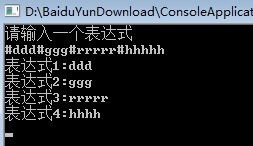数据结构表达式树,怎么让每个表达式均以“#”开始,以“#”结束
这是main
#include <stdio.h>
#include <stdlib.h>
#include <string.h>
#include <math.h>
#include "stack.h"
int main(void){
int i,j,len,cnt;
OPTR *st=(OPTR*)malloc(sizeof(OPTR));//栈的初始化
EXPT *nst=(EXPT*)malloc(sizeof(EXPT));//栈的初始化
char str[85];
char out[85];//后缀输出?
printf("请输入一个表达式\n");
scanf("%s",str);//中序输入表达式
nst->top=-1;
st->top=-1;
cnt=0;
len=strlen(str);//求字符串的长度
for(i=0;i<len;i++){
if(isnumber(str[i]))
out[cnt++]=str[i];
else{
if(str[i]=='('||isempty(st)){
push(st,str[i]);
continue;
}
if(str[i]==')'){
while(top(st)!='('){
out[cnt++]=top(st);
pop(st);
}
pop(st);
continue;
}
while(!isempty(st)&&top(st)!='('&&priority(str[i])<=priority(top(st))){
out[cnt++]=top(st);
pop(st);
}
push(st,str[i]);//把不是数字的字符入栈
}
}
//如果栈不为空,把栈里的内容放到Out数组
while(!isempty(st)){
out[cnt++]=top(st);
pop(st);
}
out[cnt]='\0';
for(i=0;i<cnt;++i)
printf("%c ",out[i]);
printf("\n");
for(i=0;i<cnt;i++){
if(isnumber(out[i])){
npush(nst,out[i]);
continue;
}else if(out[i]=='+'){
nst->data[nst->top-1]+=ntop(nst);
npop(nst);
}else if(out[i]=='-'){
nst->data[nst->top-1]-=ntop(nst);
npop(nst);
}else if(out[i]=='*'){
nst->data[nst->top-1]*=ntop(nst);
npop(nst);
}else if(out[i]=='/'){
nst->data[nst->top-1]/=ntop(nst);
npop(nst);
}
for(j=0;j<=nst->top;++j)
printf("%d ",nst->data[j]);
for(j=i+1;j<cnt;++j)
printf("%c ",out[j]);
printf("\n");
}
return 0;
}
这是stack
typedef struct{
char data[85];
int top;
}OPTR;
typedef struct{
int data[85];
int top;
}EXPT;
// 判断用户输入是否是数字
bool isnumber(char ch){
if(ch>='0'&&ch<='9')
return true;
else
return false;
}
//判断栈是否为空
bool isempty(OPTR *s){
if(s->top==-1)
return true;
else
return false;
}
//入栈
void push(OPTR *s,char ch){
s->data[++s->top]=ch;
}
void npush(EXPT *s,char ch){
s->data[++s->top]=ch-'0';
}
//出栈
char pop(OPTR *s){
return s->data[s->top--];
}
int npop(EXPT *s){
return s->data[s->top--];
}
//优先级定义
int priority(char ch){
if(ch=='(')
return 0;
if(ch=='+'||ch=='-')
return 1;
if(ch=='*'||ch=='/')
return 2;
return 0;
}
//得到栈顶元素
char top(OPTR *s){
return s->data[s->top];
}
//得到栈顶元素
int ntop(EXPT *s){
return s->data[s->top];
}
要加一个新功能就是每个表达式要用#开头,#号结束,求大佬写出完整代码啊
不知是不是这个意思,我改了一下你看看:
int main(void){
int i, j, len, cnt;
OPTR *st = (OPTR*)malloc(sizeof(OPTR));//栈的初始化
EXPT *nst = (EXPT*)malloc(sizeof(EXPT));//栈的初始化
char str[85];
char out[85];//后缀输出?
printf("请输入一个表达式\n");
scanf("%s", str);//中序输入表达式
nst->top = -1;
st->top = -1;
cnt = 0;
len = strlen(str);//求字符串的长度
char szTemp[256] = { 0 };
memcpy(szTemp, str + 1, len - 2);//将头尾的#去掉
char *ptr;
ptr = strtok(szTemp, "#");
i = 1;
while (ptr != NULL) {
printf("表达式%d:%s\n", i, ptr);
i++;
ptr = strtok(NULL, "#");
}

不是很明确你的意思,是说你的输入改成可以同时计算多个表达式,而每个表达式之间用#分割,比如
12+2#3*5+7#
这样,然后输出
14
22
是这个意思么?
那么最简单的是,scanf得到输入后用strtok切分下。
额,不是,不用分割表达式。就是简单的输入#表达式#
那么是这个意思吗:
char str[85];
char out[85];//后缀输出?
printf("请输入一个表达式\n");
scanf("%s", str);//中序输入表达式
int len = strlen(str);
if (str[0] == '#' &&str[len - 1] == '#')
{
printf("中序遍历\n");
break;
}
else
{
printf("其他操作\n");
}